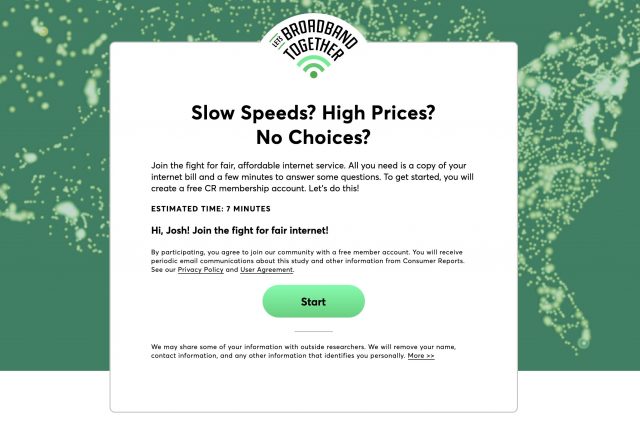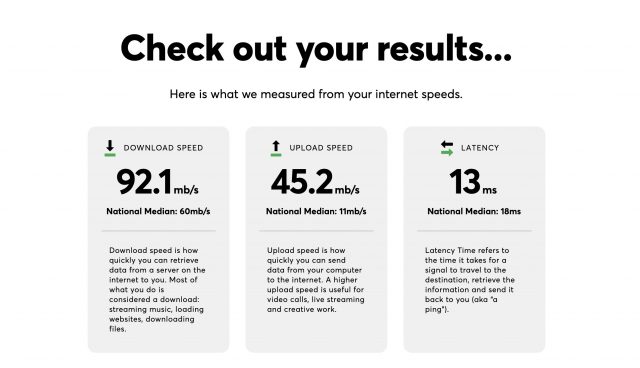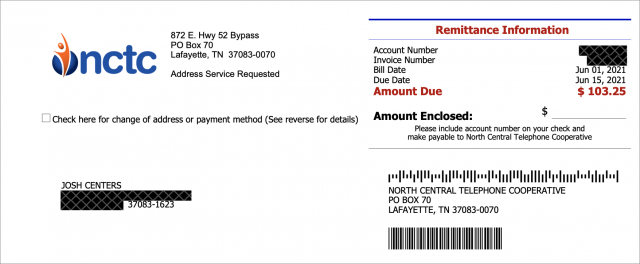Consumer Reports and The Verge Are Surveying the US Broadband Landscape
It’s no secret that Internet access in the United States isn’t great. There aren’t many choices, especially in rural areas, and ISPs often don’t deliver what they promise. It says something that many tech reviewers trashed SpaceX’s Starlink satellite service, while many of my homesteading and off-grid friends rave about it.
To learn more about the reality of broadband service in this country, Consumer Reports and The Verge are teaming up. You can participate by performing a speed test and uploading a PDF copy of your latest bill. The entire process takes about 7 minutes.
To get started, you need a Consumer Reports login. You’re prompted to create one, but if you’re a past subscriber, you can use that existing login.
First, the site walks you through performing a speed test. The first one it took for me was unusually slow. Thankfully, it provides a chance to redo the test if it’s not representative of what you normally see, but once you’ve submitted your speed report, you cannot change it.
Next, the site asks you to upload a PDF copy of your bill, and it offers instructions on how to obtain that from the most common ISPs like AT&T and Comcast.
I take a bit of issue with how this is done. Consumer Reports says it doesn’t want sensitive information like your name, address, or account number, but redacting PDFs is beyond the skill level of many people. (How many political scandals have broken out over the past decade because someone didn’t properly redact a PDF?) It’s also easy to think you’ve redacted a PDF by visually obscuring sensitive information when the data underneath can still be easily extracted.
Happily, Apple added a built-in redaction tool to Preview in macOS 11 Big Sur. Choose Tools > Redact, and then any text you select will be permanently removed when you save the document.
If you’re not running Big Sur, the best tool for most Mac users is PDFpen, which is available on its own or as part of the Setapp subscription service. Open your bill in PDFpen, make sure you have the Select Text Tool enabled (Tools > Select Text Tool), select the sensitive text, and choose Format > Redact Text — Block. If the text in your bill PDF isn’t selectable as text, you can use Tools > Select Rectangle Tool instead, followed by the Redact Text command.
Once you’ve thoroughly redacted your bill, upload it when prompted. Look carefully because I missed my phone and account number in one spot on my first pass.
Finally, the site asks a series of questions. Some are relevant, like your ZIP code and satisfaction with your service, whereas others are less so, like your political affiliation. I gave the vaguest possible answers, though interestingly, the political affiliation didn’t have a “Prefer not to say” option like the race, income, and education questions.
Over 15,000 people have already submitted responses, and we’re anxious to see what conclusions Consumer Reports and The Verge draw about the true state of Internet access in this country.



I do wonder if there will be any value at all in this survey. Given that you have to register and provide lots of (unnecessary) personal information, I imagine it will be a very small, very non-representative pool of respondents. Seems a real missed opportunity.
Just about every broadband carrier has a very large, very well compensated and funded staff of lobbyists, PR people, legal experts and financial and market analysts and marketing and sales people that help them achieve the most revenue they can get for the least amount of services, and to pick the areas that will be most profitable. It looks to me that Consumer Reports is doing a unique and good thing to determine facts about what services are available where, and what price differentials there are, and what extra fees people are regularly getting stuck with.
This methodology is much more random than sending out snail or emails, or phoning blind to solicit respondents. Asking for a redacted bill verifies that respondents are telling the truth, and they can analyze more closely what is going on where. Many areas are served by few, or just one, carrier, and in the US, there are many areas with just no choice, or no choice people can afford. There are so many varieties of services, gaps in coverage, varying speeds, and a multitude of other options. Even in big cities, there are many, many people who cannot afford a plan that would be best for them, or even any plan at all.
After working many decades in media and advertising, I think I’m qualified to say that Consumer Reports is 100% reliable and unbiased. I trust their general market research more than that of almost any other company. Hopefully, this study could provide the groundwork for better distribution of online services and fairer and more competitive pricing. That’s why I think it’s important that they are asking to see actual bills; much more often than not, people tend to forget the correct amount or out and out lie.
TidBITS has run many articles about service providers over the years, we’ve certainly had many discussions about pricing and availabilities here. So I’m going to ink out the personal information on my bill and let my voice be counted.
The fact that they don’t take money from advertisers and therefore don’t alter their reviews to satisfy advertisers doesn’t mean they are “100% reliable and unbiased”. There are plenty of sources of bias beyond pressure from advertisers and Consumers isn’t any more free of them than any other publisher.
I used to read them religiously and really enjoyed their reviews. Back then, the articles read like lab reports. There was a thorough description of their testing methodologies so you knew exactly what was was and was not meant by the conclusion.
No so much anymore. Over the years, the makeup of their board has shifted from product testing experts to activisits and lobbyists. And the quality of the testing and product reviews has suffered greatly. You read reviews that don’t say much about how they derive their conclusions - you have to assume and hope that their priorities are the same as your own.
I stopped reading their magazine when I started noticing strong biases in their reviews of technology products (especially computers), where they didn’t only disagree with me, but wrote things that were flat-out wrong. They routinely trashed every Apple product, promoting a bias that the DOS/Windows/PC world is the only viable option.
I quickly concluded that if they’re writing incorrect/inaccurate things about subjects where I’m expert, then I can’t possibly trust them when they write articles on subjects where I have no expertise.
I don’t think this makes them any worse than other review sites/magazines, but I don’t think they’re any better either. Like everybody else, their articles must be read critically and you must combine their information with information from many other sources in order to (hopefully) come to a good conclusion.
I too used to follow Consumers. My parents treated it like the end all and be all of product reviews. I too saw them review tech and audio items and they were totally off base with the review. The clincher was when my best friend bought a car that was rated #1 top car of the year - 2 years later, after he spent hundreds of dollars keeping the darned thing running, it was pretty much universally recognized as the lemon of the decade lol.
I do, from time to time, review articles they have written but take them with a grain of salt. They lost their way. Now I look to places like TidBITS to hear from people actually using the equipment to learn and select. I have learned so much from you folks and it has helped me avoid some really nasty mistakes!
I was ready to join this survey until I read about the uploading a PDF of my bill. Seems a bit intrusive, and I’m not that enthusiastic about taking the 5 minutes or whatever it would take to redact personal information.
In house reviews, product testing, and editorials are totally different animals than market research that collects and analyzes hard numbers about a set of services available, and usually necessary to, to just about the entire US population. I think it’s safe to assume the market for broadband services everywhere in the US is, and always has been, an enormous and highly confusing mess. Comparison shopping is extremely difficult and sometimes impossible.
Since the majority of people in the US were forced to work remotely for over a year due the the pandemic, and a significant % of these workers, as well as students of all levels, are considering full time work at home or a blended office/home scenario, as well as kids and adults returning to classrooms, speedy and accurate downloads and uploads have been an increasingly important consideration for families, employees, employers, and educators. To date, businesses, individuals and families do not have a credible source of comparison. Having a trusted survey of price, speed and local availability would be very helpful to many Americans.
Another plus is that the survey will enable comparative pricing. People will be able to see what costs what in their locality, and they will also be able to see what companies are charging different prices in other areas. People in NYC will get rather angry if they see LA, SF or Chicago getting cheaper rates for the same service from the same company. So there’s a chance it could help bring prices down.
Random ≠ representative
I have no complaints that they want people to upload a copy of their bills, but some of the questions they ask seem unnecessarily intrusive. And whether or not they add value to the research, their presence (and the need to create an account) will put off a lot of people from the already small percentage of the population that even get that far. My criticism is that it seems structured in a way that will represent a very small percentage of people from a particular demographic group. I hope I’m wrong.
I can’t say I agree with this characterization of the broadband market. The biggest complaint I hear is the lack of choices in broadband providers in all markets. Here, for example, I essentially have two choices: AT&T or Spectrum. It’s not hard to compare the limited offerings. It’s this lack of choice which allows these service providers to keep their prices high and provide poor customer service.
There are 1,356 ISPs in the US:
No satellite providers in your area? They are pretty ubiquitous in the US,
Some markets have more providers than others. And though there are many cable and satellite providers in New York City, the apartment building I live in only allows Spectrum and AT&T, no dishes allowed.
Satellite is available, but it’s generally much slower and has higher latency than on-ground providers. I’ve always considered it a last resort. I can, of course, get AT&T service resold by a smaller ISP, like Sonic or DSLExtreme, but in the end, AT&T is still essentially setting the prices.
To put it another way, I have never heard anyone (until you) claim they have too many choices for getting internet service. There’s a reason why these companies manage to stay in business and turn a tidy profit despite being despised by many of their customers. It’s not because of too much competition.
I mentioned that only Spectrum and AT&T are available in the building I live in, but New York City has a some other providers, including RCN and Optimum. I do see satellite dishes on roofs of private houses and small apartment buildings, but cable is by far and away the market leader.
In the latest issue of Consumer Reports, HughesNet was at the bottom of the ratings along with Viasat both of which are satellite internet services. Google Fiber topped the ratings.
I never intended to imply that satellite service is faster or better in any way then cable. I only mentioned it because they are a broadband service providers, and Consumer Reports is studying the market.
Interestingly, just a few months ago AT&T sold a significant % of its stake in Direct TV in February. “The deal values DirecTV, AT&T TV and U-Verse at roughly $16 billion combined — less than a third of the $49 billion AT&T spent [to buy DirecTV in 2015.”
I used to go by Consumer Reports, but they really got egg on their face a couple of times back in the 90s. They heavily panned the Mazda Miata because it didn’t have a back seat which showed how uniformed their understating of sports cars; then they got caught pulling some tricks with Suzuki & Isuzu vehicles to make them roll over easier than the vehicles actually did. I haven’t trusted them since.
What does a recently launched and ongoing US research study about broadband speed, access and pricing have to do with an opinion or review of a particular car model? It sounds to me like it should be a new thread,
Consumer Reports was just fine originally because the internet and web sites didn’t exist yet…then they went all woke well before the term was invented and started their political slant…not in the magazine necessarily but in other ways…so I quit trusting them long ago. Add in the fact that their technical reviews were terrible…Apple always got bad reviews from them base on cost and ’non compatibility’ since they didn’t run Windows and completely ignoring both the different ecosystems as well as the fact that Apple was only interested in profitable market segments and not at all interested in being a bottom feeder low end cheapest components they could buy computer maker. Apple has historically purchased better components than places like Joe’s Backyard Computer LLC and aimed at both higher end products as well as profitable products.
There are plenty of better review sites that concentrate on tech or cars or washing machines or whatever who actually know what they’re talking about when they do reviews IMO.
Alright, this discussion is officially in the weeds and I’m shutting it down.
Remember, the point here is that Consumer Reports and The Verge are trying to do a survey of the reality of the state of US Internet access.